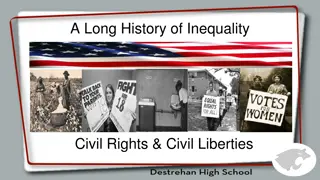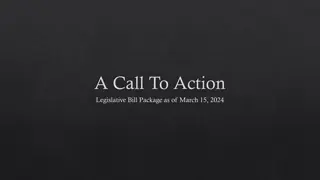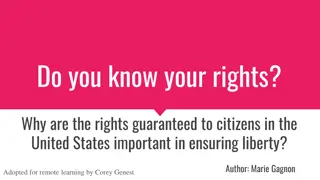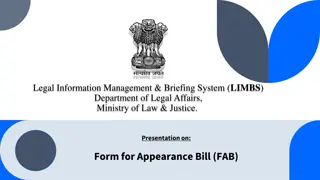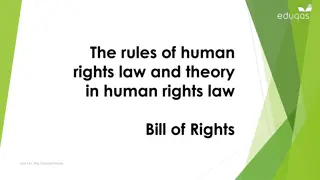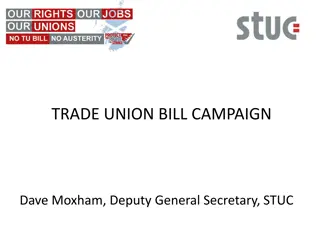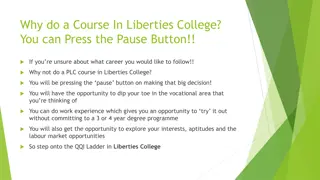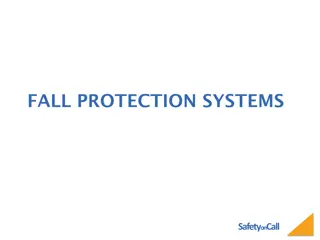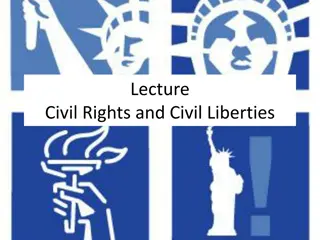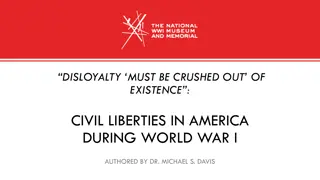
Significance of Judicial Review in Constitutional Interpretation
Explore the historical significance of judicial review in interpreting the Constitution, focusing on the Establishment Clause, Free Exercise Clause, freedom of speech, press, assembly, and the right to petition. Delve into the complexities of differentiating between "establishment" and "free exercise" with insights on key Supreme Court cases like Barnette v. West Virginia (1943).
Download Presentation

Please find below an Image/Link to download the presentation.
The content on the website is provided AS IS for your information and personal use only. It may not be sold, licensed, or shared on other websites without obtaining consent from the author. If you encounter any issues during the download, it is possible that the publisher has removed the file from their server.
You are allowed to download the files provided on this website for personal or commercial use, subject to the condition that they are used lawfully. All files are the property of their respective owners.
The content on the website is provided AS IS for your information and personal use only. It may not be sold, licensed, or shared on other websites without obtaining consent from the author.
E N D
Presentation Transcript
The meaning of the Constitution has been interpreted by the courts throughout our history (judicial review)
Congress shall make no law respecting an establishment of religion, or prohibiting the free exercise thereof (1) Establishment clause (2) Free exercise clause Government (national or state) may not adopt or endorse an official religion, but individuals have the right to practice their own beliefs.
Establishment of religion Free exercise of religion Freedom of speech Freedom of the press Right to assembly Right to petition the government for redress of grievances
There is a thin line between establishment and free exercise, and different people/groups draw the line in different places Throughout our history, the courts have been called on to interpret the Constitution and resolve these disputes Government may neither require nor prohibit religious worship
No preference doctrine vs. Wall of Separation doctrine Does the Establishment Clause simply require that government show no preference among religions, or does it require separation of church and state ? I contemplate with sovereign reverence that act of the whole American people which declared that their legislature should make no law respecting an establishment of religion, or prohibiting the free exercise thereof, thus building a wall of separation between Church & State. Thomas Jefferson, 1802
Barnette v. West Virginia (1943): West Virginia state law required public school students to salute the flag and say the Pledge of Allegiance. Jehovah s Witnesses objected on the grounds that this violates the Biblical prohibition on worshipping graven images. U.S. Supreme Court agreed that their rights to free exercise of religion and free speech were violated by this requirement. The Pledge may be recited in public schools, but students may not be required to participate (this was even before the words under God were added).
Engel v. Vitale (1962): New York State required public school students to say the following prayer in class at the beginning of each school day: Almighty God, we acknowledge our dependence on Thee, and we beg Thy blessing on us, our parents, our teachers and our country. The Supreme Court held that this is a violation of the Establishment Clause. Public school students may not be required to participate in a religious exercise. This case ended organized, required prayer in public schools.
Lemon v. Kurtzman (1971): Pennsylvania provided state support for teacher salaries, textbooks and instructional materials in secular subjects at Catholic parochial schools. The Supreme Court found that this violated the Establishment Clause and established a three- pronged test for determining whether a government practice is constitutional under this Clause:
A statute must have a primarily secular [non- religious] purpose It must neither advance nor inhibit religion It must not foster excessive government entanglement with religion. The Court held that Pennsylvania providing this type of subsidy to parochial schools failed this test and violated the Establishment Clause.
Wisconsin v. Yoder (1972): Amish children were excused from school attendance above the eighth grade, which was contrary to their family s religious practices The Supreme Court held that the families right to free exercise of religion was violated by the state law requiring mandatory school attendance
Lee v. Weisman (1992): The Supreme Court held that a prayer delivered by a clergyman at a public school graduation ceremony is a violation of the Establishment Clause. Santa Fe [Texas] Independent School District vs. Doe (2000): The Supreme Court held that a prayer led by a student before a public high school football game violated the Establishment Clause.
Adler v. Duval County [Florida] School Board (2011): The Supreme Court declined to strike down a lower court s decision permitting student-led prayer at graduation. Lower courts have disagreed on whether student-led prayer is constitutional and the Supreme Court has not chosen to definitively resolve the issue.
Herdahl v. Pontotoc County [Mississippi] Board of Education (1996): Bible reading over a public school s PA system was held to violate the Establishment Clause. Even though participating in the exercise (reading the prayer over the PA) was voluntary, listening to it was not (students were required to be at school).
A prayer led by an official (teacher, principal, adult clergy member) constitutes a government endorsement of the religious message and is therefore a violation of the Establishment Clause. A prayer at a required activity is a violation of the Establishment Clause. A voluntary, student-led prayer at a voluntary activity is permissible under the Free Exercise Clause.
Federal law stating that schools receiving federal funds (which is virtually all public schools) must allow religious groups to meet on the same basis as other clubs, if the school allows clubs at all; this has been upheld, not a violation of the Establishment Clause Voluntary participation, on school grounds, before or after the school day (when attendance is not required) See You at the Pole is voluntary and before school
The Bible may be taught as history, literature, or comparative religion Public school students may be excused for part of the school day to receive religious instruction off-campus. Students may engage in individual religious practices (such as prayer, handing out Bibles or pamphlets at school) as long as it s not disruptive. As long as there are final exams, there will be prayer in schools. Anonymous
May public schools teach a Biblical theory of creation in addition to a scientific theory of evolution? Teaching intelligent design in science classes in Dover, PA, was struck down by the courts in 2005 State laws prohibiting the teaching of evolution have repeatedly been struck down Several states have passed laws allowing for the teaching of a Biblically-based theory of creationism as a theory of human origin, but the Supreme Court has ruled that this can t be required
A New Jersey law providing school bus transportation to parochial schools on an equal basis with public school was upheld (the primary purpose was transportation, not religious instruction) Ohio had an experimental school voucher program, using public funds to pay part of tuition at private schools; students who wished to use the vouchers at religious schools could do so. This is not a violation of the Establishment Clause.
Whether the Ten Commandments may be posted in public buildings (schools, courthouses, etc.) depends on the historical context: is it there primarily as a religious document or as part of a larger historical display? Lynch v. Donnelly (1984): A creche on city property as part of a broader winter holiday display did not violate the Establishment Clause as a government endorsement of religion. Display of religious symbols on public property depends on context.
Roy Moore, Chief Justice of Alabama, was removed from office in 2003 for violating a court order to remove the Ten Commandments from the state Supreme Court building. He refused to do so as a matter of religious principle. Did he violate the Establishment Clause in his capacity as a public official, or were his individual rights under the Free Exercise clause violated?
He was acting with the authority of government and therefore the Establishment Clause outweighed his individual rights as a private citizen under the Free Exercise Clause He was subsequently re-elected Chief Justice, and now maintains that state judges may not issue marriage licenses to same-sex couples even though federal courts have legalized same-sex marriage in Alabama. He was suspended from office for this stance. (On Sept. 26, 2017, former Chief Justice Moore won the Republican nomination for the U.S. Senate.)
President Kennedy said hed resign from office if he ever felt a conflict between his oath of office (to uphold the Constitution) and his religious beliefs In response to concerns from Protestant ministers about the election of a Catholic President
In God We Trust was adopted as the national motto in 1956, added to US money and posted in public places This has been held not to violate the Establishment Clause The US House and US Senate open their daily meetings with prayer and have Christian clergy on the public payroll as chaplains Also not a violation of the Establishment Clause The Pledge of Allegiance did not originally include the words Under God
Your practice of religion may not violate the public health and safety Snake handling in religious services has been outlawed. This is not a violation of the Free Exercise Clause. Animal sacrifice in a religious ceremony is protected by the Free Exercise Clause. Narrow exception to drug laws for use by Native Americans in religious ceremonies. Employment Division v. Smith (1990): An Oregon substance abuse counselor was fired for using peyote as part of a Native American religious ritual. He had agreed not to use illegal drugs as a condition of employment. The firing did not violate his free exercise rights.
Locke v. Davey (2004): Joshua Davey had a state- funded college scholarship. He was prohibited by state law from using the scholarship to pursue a degree in theology, on the grounds that this violated the Establishment Clause (state support of a specific religion). The Supreme Court upheld the law: his free exercise rights were not violated by the restriction on his scholarship it was permissible for the state to restrict what he studied with public funding.
Family-owned companies may be exempted from the Affordable Care Act s requirements that employers provide their workers with health insurance policies that include coverage for certain types of contraception, if this violates the employer s religious beliefs.
Restrictions on freedom of speech must be narrowly tailored to serve a compelling governmental interest Clear and present danger : Schenck v. U.S. (1919). During World War I, Schenck urged young men not to submit to the military draft; the Supreme Court ruled that this was not protected speech, as it posed a clear and present danger to society.
Obscenity Pornography Slander Libel Causing injury to someone or his property Corruption of public morals Incitement to criminal activity Threats to public safety/national security Sedition (advocating violent overthrow of the government)
Roth v. U.S. (1957): Obscenity is not protected by the First Amendment. The test is whether the average person, applying contemporary community standards, finds that the work taken as a whole appeals primarily to a prurient interest. Memoirs v. Massachusetts (1966): Material must be utterly without redeeming social value in order to be found obscene (medical documentary vs. pornographic movie)
Miller v. California (1973): Overturns utterly redeeming social value test in favor of whether the work, taken as a whole, lacks serious literary, artistic, political or scientific value. (This is easier to prosecute) Ashcroft v. Free Speech Coalition (2002): Digital child pornography that is not a picture of a real child is permissible (there is no actual victim). Broadcast media have stricter standards than print or cable (CBS-owned stations were initially fined for Janet Jackson s wardrobe malfunction during the 2004 Super Bowl)
Political speech has a particularly high degree of protection Flag burning is permissible because it makes a political statement (Texas v. Johnson, 1989) Cross burning is not permissible because it serves no purpose but racial intimidation (R.A.V. v. City of St. Paul, 1992)
Public high school students have less protection of free speech than others (the principal may censor the school newspaper) Schools may have a dress code prohibiting certain types of expression Hate speech and fighting words may be prohibited
Slander: harmful statement in a transitory form (especially spoken) Libel: Harmful statement in a fixed form (writing, broadcast) New York Times Company v. Sullivan (1964): Established the legal standard for libel of a public official; it must be committed with actual malice and reckless disregard for the truth (a mistake is not libelous) Hustler Magazine v. Falwell (1988): A parody advertisement did not libel a public figure.
A well regulated Militia, being necessary to the survival of a free State, the right of the people to keep and bear Arms, shall not be infringed. Congress can ban interstate trafficking in weapons Background checks are constitutional Waiting periods for the purchase of a gun are constitutional Certain types of weapons may be banned or restricted from sale to the public
What about the militia clause? Is gun ownership a collective right or an individual right? Do you have to belong to the militia to own a gun?
U.S. v. Miller (1934): Supreme Court ruled that the 2ndAm. applies only in the context of militia membership, it s constitutional to ban ownership of a gun which is unrelated to militia service, and there is no individual right to own a gun. District of Columbia v. Heller (2008): Supreme Court found DC s almost-complete ban on handguns unconstitutional, and that the 2ndAm. grants individuals the right to own a gun. McDonald v. City of Chicago (2010) extended this right, striking down state and local prohibitions on gun ownership.
The government may not quarter troops in your home without your consent. This has never been a controversial issue.
Fourth Amendment Unreasonable search and seizure Search warrants Mapp v. Ohio (1961): Exclusionary rule evidence not obtained consistent with a warrant can t be used against you Fifth Amendment Indictment required for prosecution Protection against self-incrimination Miranda v. Arizona (1966): You must be informed of your rights at the time of arrest, or you can t be prosecuted on the basis of self-incriminating testimony Protection against double jeopardy Due process rights guaranteed Compensation for taking of private property for public use (eminent domain)
Sixth Amendment Speedy and public jury trial No anonymous testimony Right to counsel Gideon v. Wainwright (1963): Right to an attorney even if you can t afford it Seventh Amendment Right to jury trial in civil cases (where the punishment is a fine rather than imprisonment) Eighth Amendment No excessive bail or fines No cruel or unusual punishment Capital punishment only for murder committed by a mentally competent adult
Gathering of evidence Arrest Prosecution and trial Conviction and sentencing Failure to comply with your due process rights may result in your case being thrown out on a technicality. This makes it considerably harder to prosecute crime, and much easier for guilty people to get away with criminal activity.
Guilty person is convicted: Justice is served. Innocent person is set free: Justice is served. Guilty person gets away: Justice is not served. Innocent person wrongly imprisoned: Justice is not served. The process is set up this way because, if we re going to make a mistake, allowing a guilty person to walk is a less serious mistake than imprisoning an innocent person.
Implied or unenumerated rights The Bill of Rights is not an exhaustive list Just because the Constitution does not specify that you have the right to do something, does not mean you don t have the right to do it
Griswold v. Connecticut (1965): Supreme Court struck down a state law banning the sale of contraceptives, on the grounds that a married couple has a right to privacy with which the state may not interfere. First Amendment: Freedom of assembly Third and Fourth Amendments: Government may not enter your home without your consent or a warrant Fifth Amendment: Protection against self- incrimination Ninth Amendment: Enumerated rights are not an exhaustive list These add up to an implied right to privacy
Roe v. Wade (1973): The right to privacy extends to a woman s right to have an abortion early in pregnancy. Subsequent cases have imposed conditions on this right. The right to privacy has also been held to strike down restrictions on certain types of consensual adult sexual activity.
Restricts the powers of the federal government to those enumerated in the Constitution; everything else is reserved for state governments and the people.
XIII Amendment (1865) Abolished slavery Abolished involuntary servitude except as punishment for a crime Not involuntary servitude: The military draft Work requirements for welfare recipients Community service requirements in schools
XIV Amendment (1868) Rights of citizenship All persons born or naturalized in US and subject to its jurisdiction are citizens (overturned Dred Scott decision that slaves had no citizenship rights) Natural-born citizens can be president, naturalized can t A naturalized citizen may have his citizenship revoked (ex-Nazis who lied to get into the country after WWII) Anyone born in the US is a citizen unless their parents are foreign diplomats Babies born in US to illegal immigrants are US citizens (current controversy)
Rights of citizenship Babies born here to foreign citizens are usually dual citizens of US and parents country Babies of US citizens born abroad are usually dual citizens of US and country of birth (even if Obama HAD been born in Kenya, he would be a dual US/Kenyan citizen because his mother was a US citizen; dual citizens have all the rights of citizenship in both countries) Children of US military and diplomatic personnel born abroad are US citizens If unmarried father is a US citizen and mother isn t, paternity must be proven to establish citizenship
Due Process and Equal Protection of the Laws The Due Process Clause of the 14thAmendment extends some protections of the Bill of Rights to actions by the states (this is known as incorporation of the Bill of Rights) Equal protection: The laws apply equally to everyone Brown v. Board of Education (1954): Legally required segregated schools violate the Equal Protection Clause

